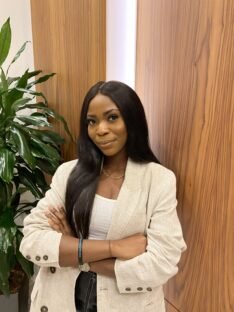
Meet Bukola Smart. She is a multi-talented millennial passionate about helping young people succeed in their financial lives. She is also known for being a personal finance podcast host, speaker and author of the books ‘The ABCs of Personal Finance’ and ‘Investing for Beginners’.
Question 1: What inspired you to write this book?
It’s a book I wish I had when I was just getting started with investing or thinking about it.
But it’s all the questions I constantly get from my Save Spend Invest community that really inspired me to write it.
I always get questions about how to get started with investing,a lot of the current book options can be complicated and use a lot of words not easy to understand so I wanted to write a straight to the point book so as soon as you’re done reading you can make your first investment.
Question 2: At what age/stage in one life should one start investing?
As early as possible!
My parents started investing on my behalf very early as a teenager but I didn’t understand much. I later started on my own at 20.
Once you’re comfortable with what investing means and you’re financially stable too, I think everyone should do it regardless of how old you are, financial literacy is important and investing time is your greatest asset.
Question 3: What type of investment opportunities should beginners start with/look for?
Lower risk investments like mutual and index funds are my best investment opportunities to start with.
So you can get your feet wet and overtime build your risk appetite for higher risk/reward ones.
Index funds allow you to benefit from the diversity in the funds portfolio and help you understand what industries or companies you’re more interested in.
Question 4: What are the things all beginners should know before investing?
Know:
– that ALL investments rise and fall.
– what you’re investing for and your time horizon
– the investment portfolio or company, how they make money, what factors affect their growth potential
– what level of risk you’re taking for the reward you stand to gain
– your investment and risk profile
– whether you want to be an active or passive investor and the research needed for both
– how to do your due diligence on every investment opportunity.
Question 5: Investing comes with risk, how can one determine his/her risk profile?
I have a questionnaire I use in my book, but you can find other questionnaires on some investment platforms. There’s a really good on motley fool here. How risk-averse are you? These questions will shed some light.
Question 6: How would you advise beginners to build a diversified portfolio?
I’d say start with understanding the basics of the different investment types and assets
Stocks, REITs, mutual and index funds, real estate etc.
Then choose what percentage of your portfolio you’d want to allocate to them based on your risk type and goals.
Question 7: Which should be prioritised more as a beginner, principal security or interest rate(returns)?
As a beginner it’s important to prioritise your principal as this will allow you to be confident until you feel more comfortable with highs and lows of investing then you can optimise for rate of return.
Question 8: What questions should beginners ask potential investment house/fund managers?
Ask:
-What fees they charge and when is it taken out, before or after investing
-What their track record is (although not indication of future results)
-What’s the diversity of their portfolio
-Are they an active or passive fund
-What is their investment thesis
Question 9: What is your investment philosophy?
Currently it’s a mix of growth and value investing
Identifying companies that are valuable but overlooked or not priced at their true worth and would provide long term growth potential that are above the average market return.
Question 10: How can low income earners fit investing into their budget?
I’d say start small.
If you’re able to currently save, you should take a portion out of that every month and put it in investments that fit your budget. As long as it’s money you won’t need for the short term and you have an emergency fund saved.
IF YOU HAVEN’T YET, SIGN UP FOR OUR NEWSLETTER ON WWW.BRAVEWOOD.NG FOR THE BEST, HIGH-YIELD SAVINGS TAILORED TO HELP YOU REACH YOUR GOALS AND WEEKLY INSPIRING CONTENT THAT WILL SPUR YOU TO SUCCESS.

